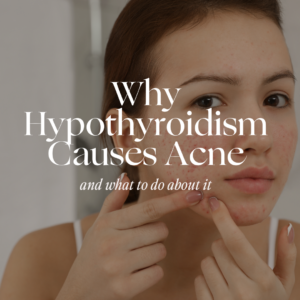Why Hypothyroidism Causes Acne & What to do About it
by Registered Dietitian and Thyroid Specialist, Lauren Papanos | 17 Oct 2023
Acne breakouts and hypothyroidism – could there be a link between pesty breakouts and your thyroid function? Let’s discuss how the thyroid impacts your skin health and what you can do to clear breakouts.

Learn the link between low thyroid function or hypothyroidism and breakouts like acne
What is hypothyroidism or low thyroid function?
Hypothyroidism is a condition that affects 4-10% of all women. It occurs when the thyroid gland doesn’t make adequate amounts of thyroid hormones. This can occur because of auto-immunity, such as in the case of Hashimoto’s disease. It can also occur during hormonal changes like: postpartum, menopause, birth control and amenorrhea (no period).
How does hypothyroidism affect acne?
In hypothyroidism, the skin can become dry, coarse and scaly. That’s because the thyroid is an important regulator of epidermal balance. There are several thyroid hormone responsive genes and thyroid hormone receptors in the skin. These thyroid hormones regulate skin texture and moisture which in turn leads to a change in skin health.
What’s going on with acne?
Acne occurs when hair follicles get clogged with sebum (oil), dead skin cells and bacteria. This can be caused by both imbalances in hormone levels and gut health.
Root causes of hypothyroidism and acne
Hypothyroidism and acne share many similar root causes. Situations like: gut bacteria imbalances, inflammation, high stress hormones, sluggish liver and blood sugar both impact thyroid activity and acne formation.
What to do about acne with hypothyroidism
1. Rebalance the gut
Research supports the link between acne and the condition of the digestive tract and gut bacteria (microbiome). The gut is responsible for impacting skin bacteria as well as inflammation and immune regulation. Our emotions also affect our gut, which can cause inflammation in the gut and throughout the body.
2. Address inflammation
Inflammation can come from many sources. As mentioned above, the gut can be a major source of inflammation in the body. Specific nutrient deficiencies, such as low omega 3 fatty acids, also link to inflammation. Histamine, a substance made by the immune system in response to environmental allergens can also impact inflammation and the thyroid.
3. Achieve stress balance
Research has well established that stress hormones like cortisol have a significant impact on acne and the thyroid. Stress hormones increase sebum (oil) production as well as decrease skin cell turnover. They also decrease inactive (T4) to active (T3) thyroid hormone conversion. Achieving stress balance may look like auditing things like exercise, psychological and emotional stress, sleep and nutritional stressors.
4. Support the liver
The liver plays an important role in hormone balance and gut health. The liver is where metabolism of thyroid hormones happens. Most of the conversion of inactive (T4) thyroid hormone to active (T3) thyroid hormones happens in the liver as well.
5. Nourish your body
Food plays one of the most critical roles in reducing breakouts and improving thyroid function. One place to start is with improving blood sugar balance and insulin regulation. The hormone insulin responds to blood sugar changes and regulates sebum (oil) production. Secondly, we recommending incorporating essential nutrients like antioxidants, fatty acids and minerals into your diet.
Get to the root
If you are experiencing acne and hypothyroidism, we recommend starting here so that you can begin to understand and address your root causes. By investigating these you can learn the exact imbalances that are driving both breakouts and low thyroid hormones. You can work with one of our specialized practitioners to learn your root causes and receive a personalized treatment action plan.
Comments +